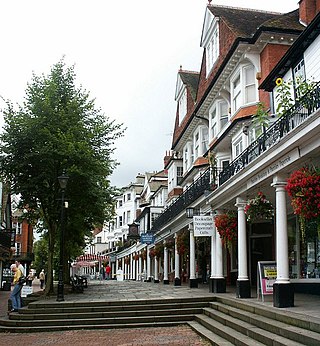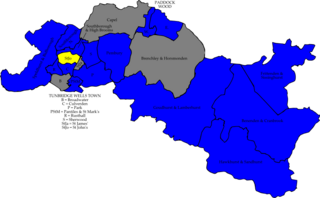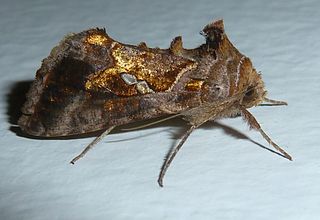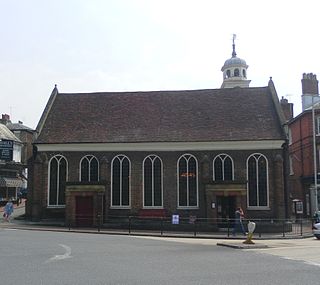
Royal Tunbridge Wells is a town in Kent, England, 30 miles southeast of central London. It lies close to the border with East Sussex on the northern edge of the High Weald, whose sandstone geology is exemplified by the rock formation High Rocks. The town was a spa in the Restoration and a fashionable resort in the mid-1700s under Beau Nash when the Pantiles, and its chalybeate spring, attracted visitors who wished to take the waters. Though its popularity as a spa town waned with the advent of sea bathing, the town still derives much of its income from tourism.

The Borough of Tunbridge Wells is a local government district with borough status in Kent, England. It takes its name from its main town, Royal Tunbridge Wells. The borough also contains the towns of Paddock Wood and Southborough, along with numerous villages and surrounding rural areas. Large parts of the borough fall within the High Weald Area of Outstanding Natural Beauty.

The Spa Valley Railway (SVR) is a standard gauge heritage railway in the United Kingdom that runs from Tunbridge Wells West railway station in Royal Tunbridge Wells to High Rocks, Groombridge, and Eridge, where it links with the Oxted Line.

Tunbridge Wells train station is on the Hastings line in the south of England and serves Royal Tunbridge Wells in Kent. It is 34 miles 32 chains (55.4 km) down the line from London Charing Cross. The station and all trains serving it are operated by Southeastern.

Tunbridge Wells is a constituency in Kent represented in the House of Commons of the UK Parliament since 2024 by Mike Martin, a Liberal Democrat.

Tunbridge Wells Football Club is a football club based in Royal Tunbridge Wells, Kent, England. They are currently members of the Southern Counties East League Premier Division. They play their home games at Culverden Stadium. The club is affiliated to the Kent County Football Association.
The phrase "Disgusted of Tunbridge Wells" is a generic name used in the United Kingdom for a person with strongly conservative political views who writes letters to newspapers or the BBC in moral outrage. Disgusted is the pseudonym of the supposed letter writer, who is a resident of the stereotypically middle-class town of Royal Tunbridge Wells, Kent, in southeast England. The term may have originated with either the 1944 BBC radio programme Much-Binding-in-the-Marsh, a regular writer to The Times or an editor of the letters page of a local newspaper, the Tunbridge Wells Advertiser.

The Nevill Ground is a cricket ground at Royal Tunbridge Wells in the English county of Kent. It is owned by Tunbridge Wells Borough Council and is used by Tunbridge Wells Cricket Club in the summer months and by Tunbridge Wells Hockey Club in the winter. It was opened in 1898 and was first used by Kent County Cricket Club in 1901. Until 2019, the county held the Tunbridge Wells Cricket Week on the ground annually, despite a suffragette arson attack which destroyed the pavilion in 1913.
One third of Tunbridge Wells Borough Council in Kent, England, is elected each year, followed by one year without election. Since the last boundary changes in 2002, 48 councillors have been elected from 20 wards.

The 2007 Tunbridge Wells Borough Council election took place on 3 May 2007 to elect members of Tunbridge Wells Borough Council in Kent, England. One third of the council was up for election and the Conservative Party stayed in overall control of the council.

Chrysodeixis eriosoma, the green garden looper, known in New Zealand as the Silver Y, is a moth of the family Noctuidae. Mostly cosmopolitan in distribution, it is a pest in Japan, China, India, Sri Lanka, the Malay Peninsula and Australasia. It is present in Hawaii and recorded as an incursion in mainland North America and Russia. It is morphologically identical to Chrysodeixis chalcites and the two may be sibling species.

Chrysodeixis chalcites, the tomato looper or golden twin-spot moth, is a moth of the family Noctuidae, subfamily Plusiinae. It mainly lives in southern Europe, the Levant and tropical Africa, but can be seen migrating across much of Europe. In 2013, it was spotted in Canada. It is an important horticultural pest in New Zealand.

Chrysodeixis is a genus of moths of the family Noctuidae described by Jacob Hübner in 1821.

The Church of King Charles the Martyr is a Church of England parish church in Royal Tunbridge Wells, Kent, England. It is a Grade I listed building.












